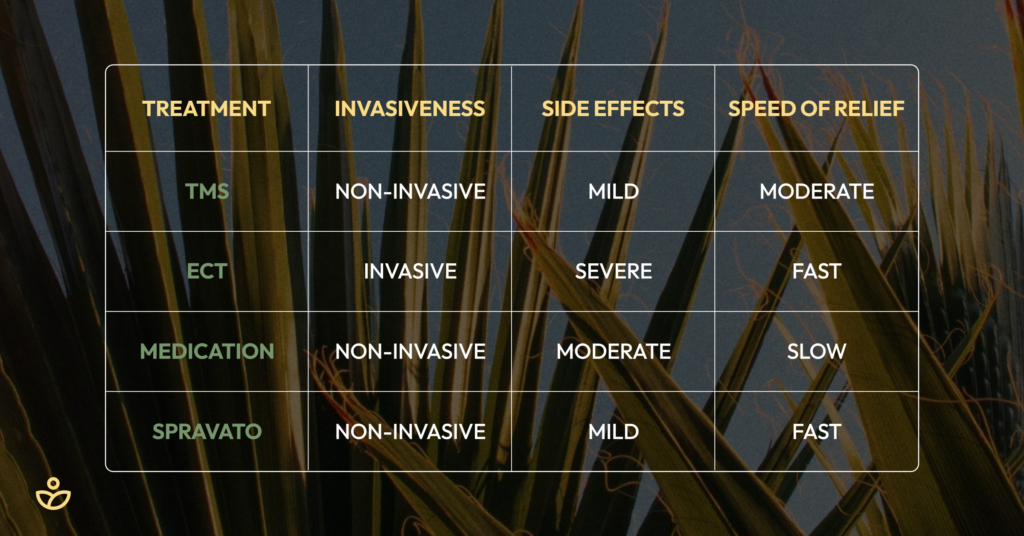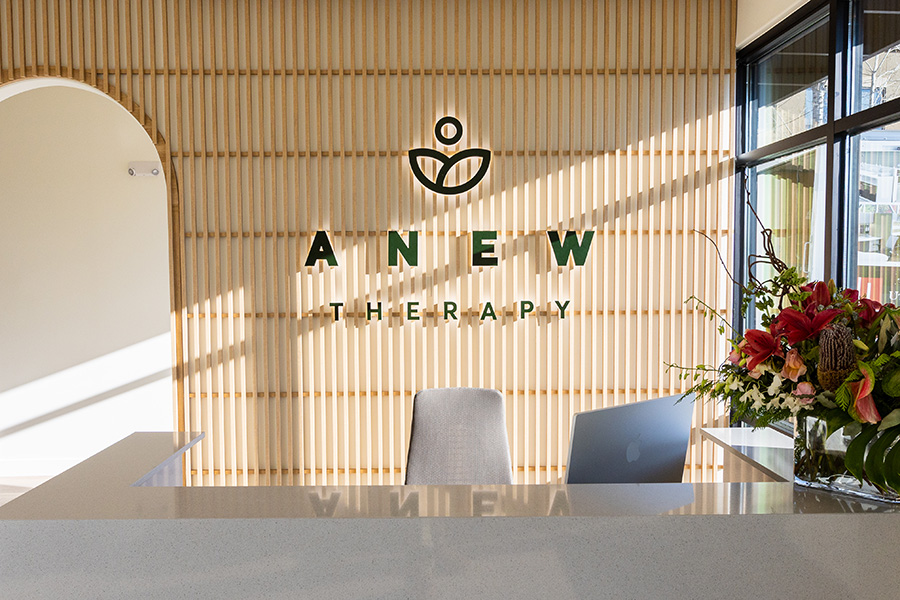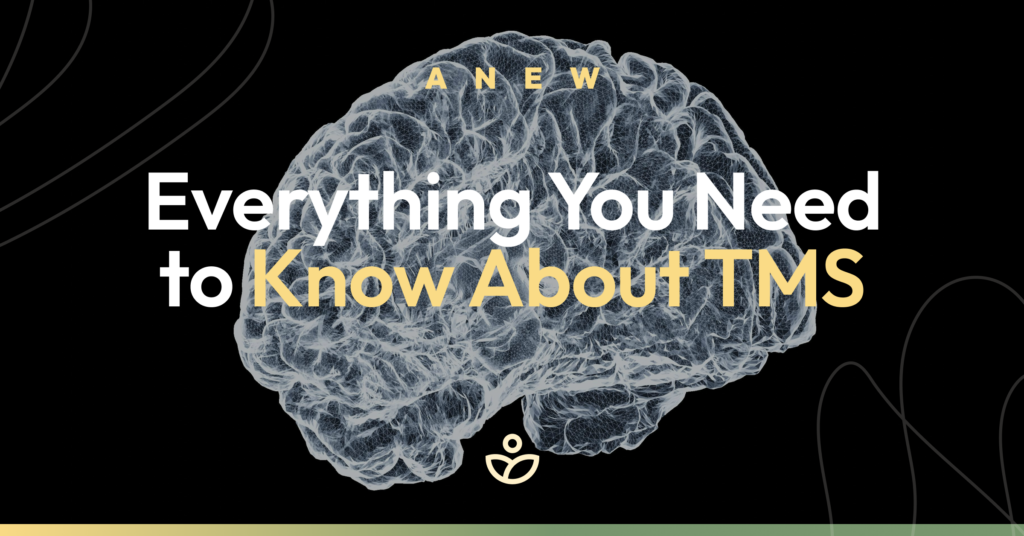Transcranial Magnetic Stimulation (TMS) is a cutting-edge therapy that uses magnetic fields to influence brain activity. It’s a noninvasive treatment, which means no surgery or incisions are needed. TMS is primarily used to treat depression, obsessive-compulsive disorder, and other brain-related conditions when other treatments haven’t worked.
Key Points about TMS:
- Noninvasive Treatment: No need for surgery
- Targets Specific Brain Regions: Focuses on areas related to mood and decision-making
- Mild Side Effects: Temporary headaches or scalp discomfort
TMS has been around since 1985 and uses an electromagnetic coil to affect the brain’s natural electrical activity. This approach can improve how your brain functions, as well as providing relief from persistent depression and anxiety.
Understanding TMS
How TMS Works
Transcranial Magnetic Stimulation (TMS) operates using magnetic fields to stimulate specific brain regions. At its core, TMS involves an magnetic coil placed against the scalp. This coil emits magnetic pulses that penetrate the skull and influence the brain’s electrical activity.
The process is straightforward:
- Placement of the Coil: The coil is positioned over the area of the brain that needs stimulation. For depression, this is usually the prefrontal cortex, associated with mood regulation.
- Emission of Magnetic Pulses: The coil sends out magnetic pulses, creating tiny electrical currents in the brain. These currents activate neurons, which can improve mood and reduce symptoms of depression.
- Adjustment of Parameters: Technicians can adjust the intensity and frequency of the pulses to suit individual patient needs.
Types of TMS
There are two main types of TMS treatments: Repetitive TMS (rTMS) and Deep TMS (dTMS).
- Repetitive TMS (rTMS): This is the most common form and involves delivering magnetic pulses in a repetitive sequence. It’s FDA-approved for treating depression and is known for its precision in targeting specific brain areas.
- Deep TMS (dTMS): As the name suggests, this type reaches deeper brain regions. It uses specialized coils to penetrate further into the brain, potentially offering relief for conditions like obsessive-compulsive disorder (OCD).
Both types are noninvasive and have been shown to be effective for individuals who haven’t responded to traditional antidepressants.

FDA Approval: TMS is FDA-approved for major depressive disorder and OCD, making it a trusted option for those seeking alternative treatments.
TMS is an evolving field with ongoing research exploring its potential benefits for other conditions like Parkinson’s disease and chronic pain. As understanding grows, so does the promise of TMS as a versatile treatment tool.
In summary, TMS offers a noninvasive, targeted approach to treating depression and other mental health conditions. It’s an exciting option for those looking for alternatives to medication. At Anew Therapy, we also offer Spravato, an esketamine nasal spray often covered by insurance, and IM ketamine therapy as effective treatments for depression.
Benefits and Risks of TMS
Transcranial Magnetic Stimulation (TMS) is a noninvasive treatment that offers a range of benefits with relatively few risks. It’s particularly appealing for those who have not found relief through traditional medication or therapy.
Common Side Effects
TMS is generally well-tolerated, but like any treatment, it can have side effects. The good news is that these are usually mild and temporary.
- Scalp Discomfort: It’s common to feel a bit of discomfort or tingling at the site where the coil is placed. This is usually brief and subsides after the session.
- Headaches: Some people report mild headaches following a session. These can often be managed with over-the-counter pain relievers.
- Facial Muscle Twitching: Occasionally, the magnetic pulses may cause slight twitching of facial muscles. Again, this is typically mild and resolves quickly.
Most people find that these side effects diminish as they continue with their treatment sessions.
Uncommon Side Effects
While serious side effects are rare, they can occur. It’s crucial to be aware of them so you can make an informed decision.
- Seizures: The most serious risk associated with TMS is the possibility of a seizure. However, this is extremely rare, with a risk of less than 0.01% per session.
- Hearing Loss: Proper ear protection is essential during treatment to prevent any risk of hearing damage.
Experts have conducted numerous studies on TMS, and none have linked it to harmful changes in the brain. It’s considered a safe option, especially when compared to more invasive treatments.
TMS offers a promising alternative for those seeking relief from depression and other mental health conditions. However, discuss any concerns with your healthcare provider to ensure it’s the right choice for you.
TMS vs. Other Treatments
When it comes to treating depression and other mental health conditions, there are several options available. Let’s break down how Transcranial Magnetic Stimulation (TMS) compares to other treatments like Electroconvulsive Therapy (ECT), traditional medications, and emerging therapies like Spravato.

TMS vs ECT
Electroconvulsive Therapy (ECT) has been around for a long time and is known for its effectiveness in severe cases of depression. However, ECT is invasive, requiring anesthesia and inducing seizures, which can lead to memory loss and other significant side effects.
In contrast, TMS is noninvasive and doesn’t require anesthesia. While both treatments aim to stimulate brain activity, TMS uses magnetic pulses instead of electrical currents, resulting in fewer and milder side effects. This makes TMS a more appealing option for those who are concerned about the invasiveness and side effects of ECT.
TMS vs Medication
Traditional antidepressants, such as SSRIs and SNRIs, are often the first line of treatment for depression. However, they can take weeks to show effects, and many people experience side effects like weight gain, sleep disturbances, or sexual dysfunction.
TMS offers an alternative for those who haven’t found relief with medications. It’s particularly beneficial for individuals who have experienced negative reactions to antidepressants. While TMS requires multiple sessions, it provides a different mechanism of action that can be effective when medications fail.
TMS vs Spravato
Spravato is a relatively new treatment option that has gained attention for its rapid symptom relief in cases of treatment-resistant depression. It’s an esketamine nasal spray that acts quickly, offering hope to those who need immediate relief.
Unlike TMS, which requires daily sessions over several weeks, Spravato can provide noticeable improvements in a much shorter time frame. Moreover, Spravato is often covered by insurance, making it a more accessible option for many patients.
At Anew Therapy, we offer a comprehensive approach to managing treatment-resistant depression, incorporating TMS, Spravato, and IM ketamine therapy into our treatment plans. Each treatment has unique benefits, and we believe in leveraging these differences to tailor therapy to the individual needs of our patients..
Conclusion
At Anew Therapy Utah, we believe in a holistic approach to mental health. Our goal is to be our patient’s one-stop-shop for mental health and well-being. We understand that managing mental health conditions like depression requires a comprehensive strategy custom to each individual.
Our treatment options include innovative therapies like Transcranial Magnetic Stimulation (TMS), Spravato, and ketamine therapy, which are at the forefront of depression treatment. These therapies are known for their rapid symptom relief, making them ideal for individuals who need quick intervention.
We aim to offer hope and relief to those who have not found success with traditional methods. We are committed to supporting your mental health journey every step of the way.
For more information about the conditions we treat and our comprehensive mental health solutions, visit our home page.

Searching for the best TMS clinic in Utah? Anew Therapy offers expert care and proven results. Schedule your free intake appointment today.

